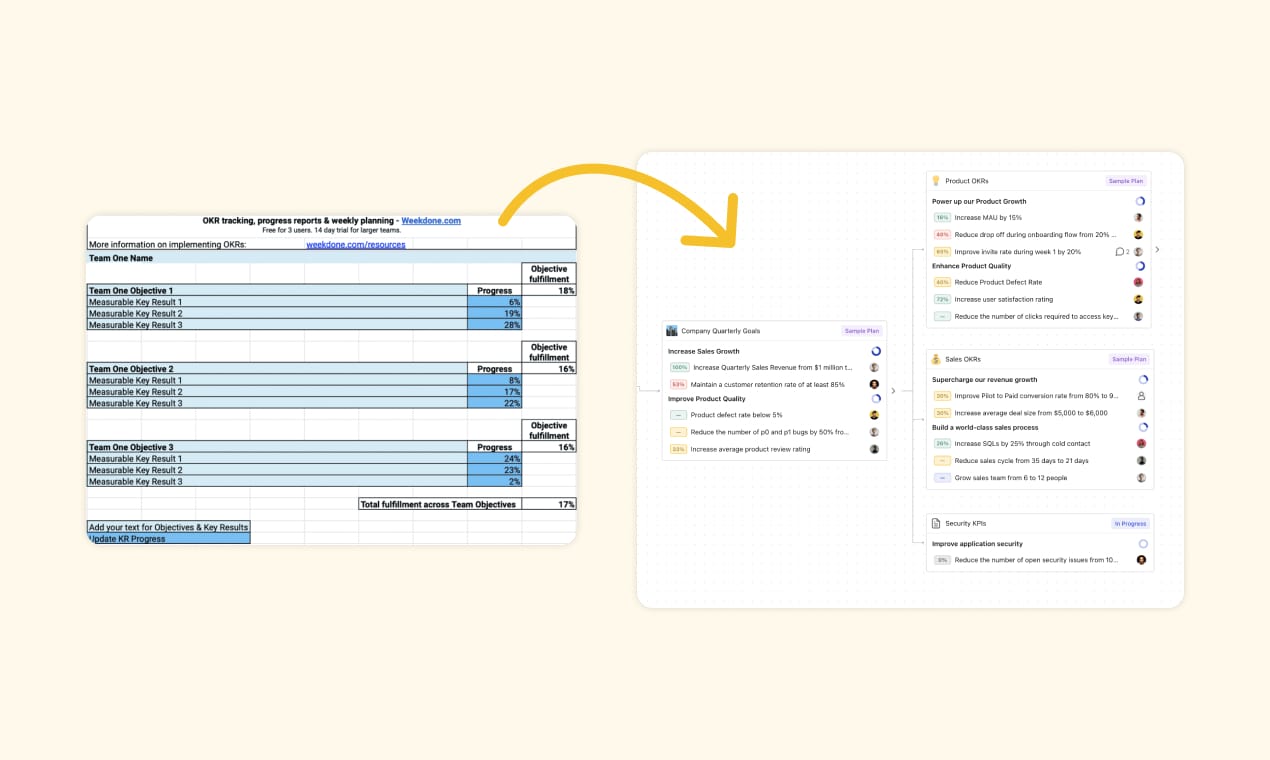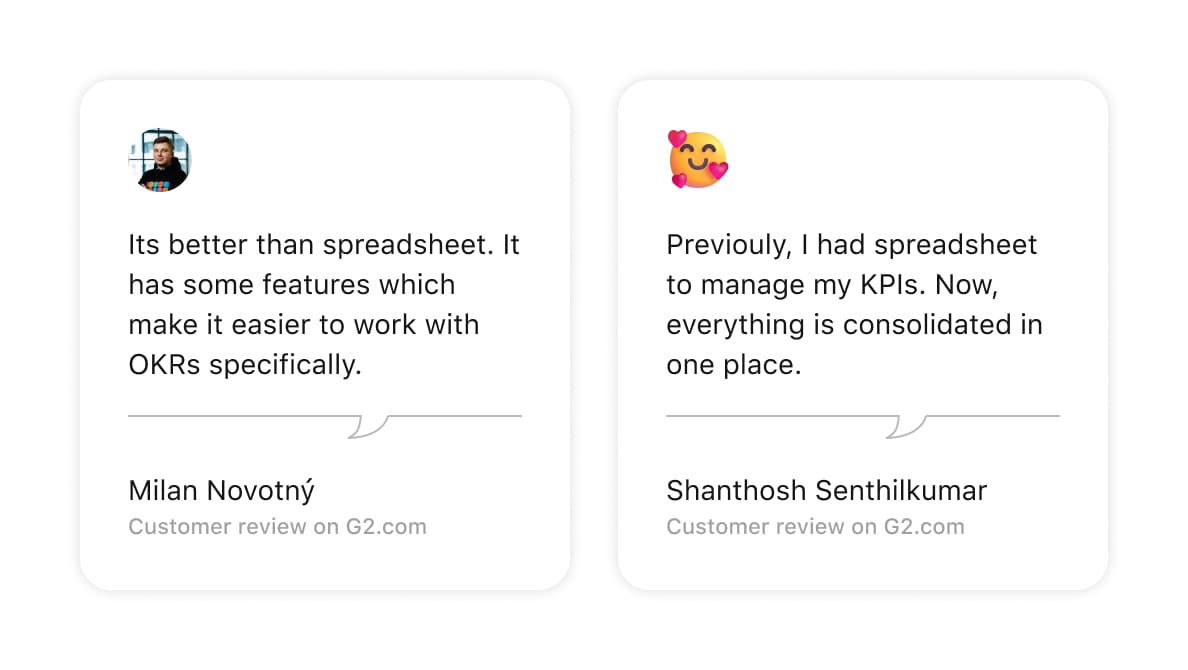Importing from goals spreadsheet into Tability
Spreadsheets are great for a lot of things, but your OKRs are not one of them. Here we break down the benefits, as well as how to finally make the move to a dedicated OKR tool.

The number one tool used for tracking business goals is spreadsheets. Which is no surprise. It's a great tool, and an industry default for just all things business. It's versatile, familiar and incredibly powerful once you get it set up right and got your formulas all figured out. Accounting, metrics, projections, leads – it all usually starts in a spreadsheet when you're starting out. It's a great way to start getting your ideas out on paper without having to commit to a specific workflow or tool.
You don't go from nothing to OKR expert overnight, there are many stages to the OKR journey. Starting out, using spreadsheets to get your ideas out, set a north star, and have a working document that you can reference from time to time is usually enough. There are a lot of OKR spreadsheet templates out there. Quite often, new businesses start by just throwing ideas on the wall and seeing what sticks.
But maybe you're a growing business now. You have some Product Market Fit. You have a few employees. You might even have some revenue.
How are you tracking of your business goals in a spreadsheet? It's just not good enough.
The lifecycle of your goals spreadsheet
Here's usually what happens to your goals spreadsheet:
- You have your quarterly planning sessions. You set your goals in your spreadsheet and you're stoked about them. You have a goal, a trajectory, and a good sense of what your focus should be.
- You're a busy person. You have employees, stakeholders, customers, friends, family, social media, etc. There are a lot of distractions, and your goals you set last week... what goals?
- It's now time for the quarterly review. Let's take a look at those OKRs and see how we did toward achieving those goals. There's no progress, no history, and we can't even remember what we did to try and achieve those goals over the last few months. Usually, you also miss the goal by a lot.
- Ok, new quarter. Let's start fresh... *clicks File>New sheet * 😇
NO! This is crazy.
Your business goals is the most important part of your business, so why are we still setting and tracking our goals in the same tools we used for our high school projects? What's the point of setting goals in the first place if we aren't using them?
If you're going to actually try and accomplish these goals, you need to set the right processes in order to stay on top of them and maintain focus and accountability. They're your goals, you should be trying to reach them.
While you're not going to get good at OKRs overnight, there are many reasons why OKRs are so effective, and it starts to become crucial to any business to have a solid outcome-driven culture to maintain good momentum, focus, and transparency in your org.
So first things first: You need to get them out of your spreadsheets.
What spreadsheets can't provide for your goals
There are many benefits to having a proper OKR tool and getting your goals out of a spreadsheet. Simply put, a spreadsheet just wasn't made for tracking your OKRs.
For those of you using Tability, you already know.

Using a tool like Tability can bring so much to your OKR and goal tracking processes that a spreadsheet simply cannot provide:
- Find a single source of truth for all things related to your goals (no more hunting down random Google docs).
- Get reminders to check-in and update your goals so that you stay focused and aware of how things are tracking.
- Get visualizations to help you see progress in real time and digest information faster.
- Turn your goals into presentations and reports instantly.
- Measure your team's OKR engagement.
- Create discussions and get input from stakeholders all in one place.
And there's still so much more to it. Your goals will go from being a lost document in your google suite, to being the heartbeat of your company.
Moving your goals spreadsheet to a goal tracker
Ok so now you've made the choice to move your goals from your spreadsheet to a dedicated OKR platform. If you only have a few goals, or you're at the start of a new quarter, this part will be easy. You're starting fresh so there won't be too much to do to transfer those goals over.
Starting fresh with a OKR tool
For those of you starting fresh, there are tons of resources on how to write good effective goals out there. From tutorials, to best practices, to even generating goal templates with AI, we have you covered. Try some of these articles if you're looking for a place to start with your OKR journey:
- How to write SMART goals
- Creating goals in 30 seconds with AI
- OKR examples and templates for every use case
Most tools make it easy to add goals into their platform, so whether you have a few OKRs or 10, this part should be no problem
Importing multiple teams, OKRs and goals
If you're managing multiple teams, this task gets a bit more tedious. You have multiple teams, tons of users, goals for everyone, and messy connections that you have to maintain between all those things. You've put a lot of work into your spreadsheet, and well, it may be a lot of work taking it apart.
To solve for this, we've added a spreadsheet importer.
Check out this quick demo on how to import your spreadsheet into Tability:
It'll import not only a goal or one set of OKRs, but it can also bring in entire plans and subplans. This way your intricate cascade of goals and OKRs won't be disrupted and will be translated directly into Tability.
Get your goals out of spreadsheets
This is just step one. It takes a lot to find success and achieve all of your business goals. Getting that proper tooling, process, and those weekly rituals in place will ensure that you have the best chances of getting there.
If you have any questions about the new importer or just how to get better at your OKRs, let us know. You can also join us in our Slack Community to talk to fellow OKR-ers like yourself, as well as anyone on our team.

